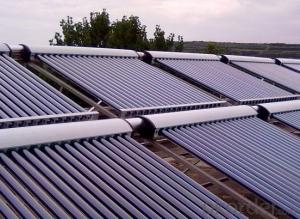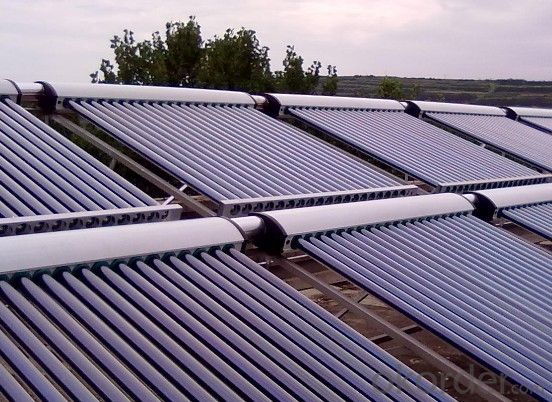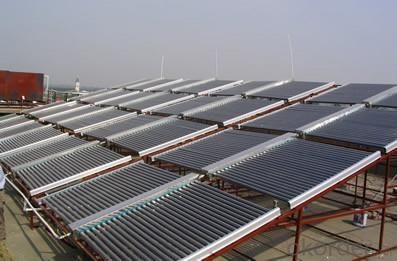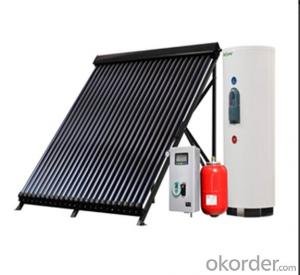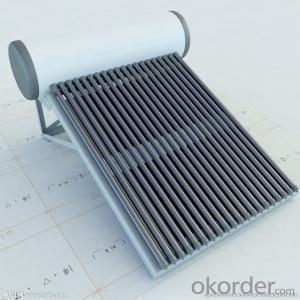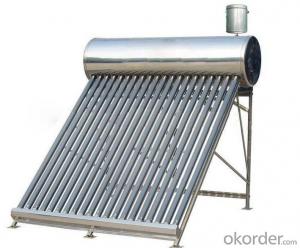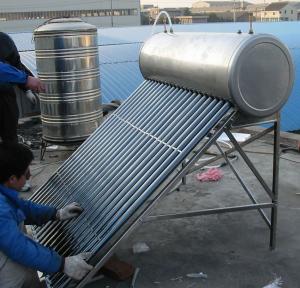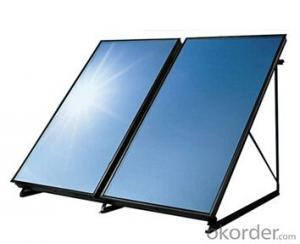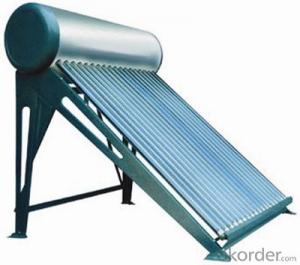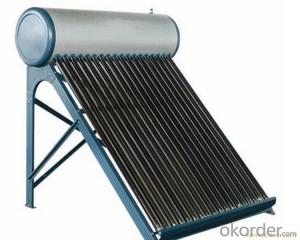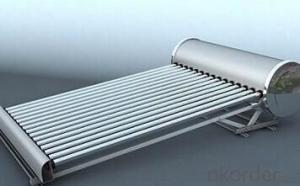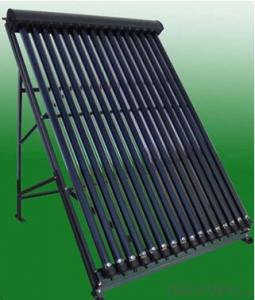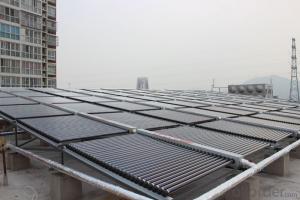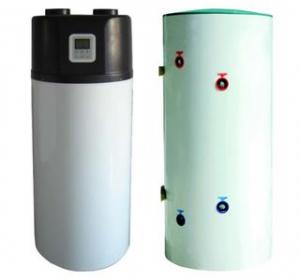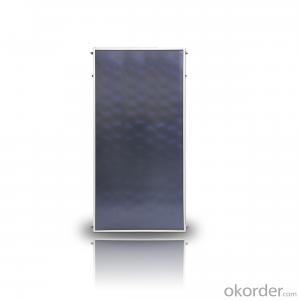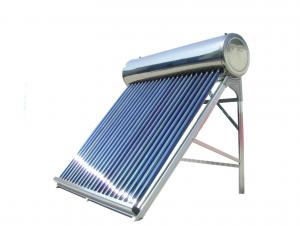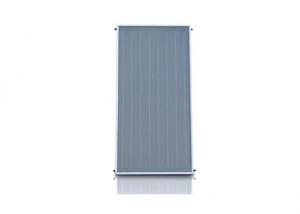High Quality 150L Solar Water Heater with Aluminum Alloy Frame - Solar Water Heater Manufacturer
- Loading Port:
- China main port
- Payment Terms:
- TT OR LC
- Min Order Qty:
- 10 set
- Supply Capability:
- 10000 set/month
OKorder Service Pledge
OKorder Financial Service
You Might Also Like
Solar water heaters features
1. The upright tank can make the water temperature to a high level. It can hot the water instantly
2. The tank inside the building, the hot water loses less energy than the normal one
3. The solar collector and the tank of solar water heater is separated, that makes the system combine with the building perfectly, which will reduce the sightseeing for the building and environment around
4. Back up with electric heater so that in the day without sunshine hot water can also be used
5. Can be combined with gas or electric heater
6. Max. Pressure: 12bar; Operating Pressure: 6 bar
7. It can be used for other function, such as warming
Solar water heaters working principle
1. The solar collector absorbs solar energy and transmits it to the solar water heater tank through circulation
2. When the temperature of the collector reaches the set value, the controller starts the circulation pump automatically
3. The circulation pump makes heat-conducting liquid circulate automatically
4. The heat-conducting liquid transfers heat to water by lower heat exchanger in the water tank.
5. When the temperature difference between solar collector and heat pipe solar water heaters tank doesn't reach the set value, the circulation pump will be shut automatically
6. In case the temperature of the water tank does not reach Tmax, Electric Heating Element will start to work automatically
Solar water heaters working station component:
1. Operating screen
2. Manometer
3. Pump speed adjust switches
4. Temperature difference circulation pump
5. Flow rate indicator
6. Return circuit connector
7. Safety valve
8. Expansion vessel connector9. Return circuit connector
10. Wall mounting
11. Expansion vessel:8L
12. Pressure resistance: 10 bar pressure for expansion vessel
Solar water heaters specification:
Description | solar water heaters |
Material of out manifold | 0.55mm thickness color steel/ fluorine carbon steel |
Material of inner tank | Food grade 2.0 mm thickness SUS304 stainless steel |
Tank insulating layer | 40mm 45kg/m³ high-density polyurethane foamed |
Inlet and outlet hole | Male G1'' |
Max pressure | 0.6 Mpa |
Solar collector tube | 3.3 Borosilicate glass with N/Al coating |
Thickness of glass tube | 1.6mm |
Vacuum tube tightness | P≤0.005 Pa |
Absorption | as=0.93-0.96 (AM1.5) |
Emission ratio | εh=0.04-0.06 (80C±5C) |
Idle sunning property parameters | Y=220~260m2.C/KW |
Average heat loss coefficient | ULT=0.6~0.7W/(m2.C) |
Bracket: | 2.0mm thickness aluminum alloy |
Tank weight | 75KGS |
Tank size | 560mm Dia x 1810mm Height |
Tank capacity | 300L |
Solar collector | 2pcs 58x1800x15tube solar collector |
Absorber area | 2.811 m² |
Working station | SP116 working station |
Heat exchanger length | Upper:12m, Underside:18m |
Solar water heaters details show:
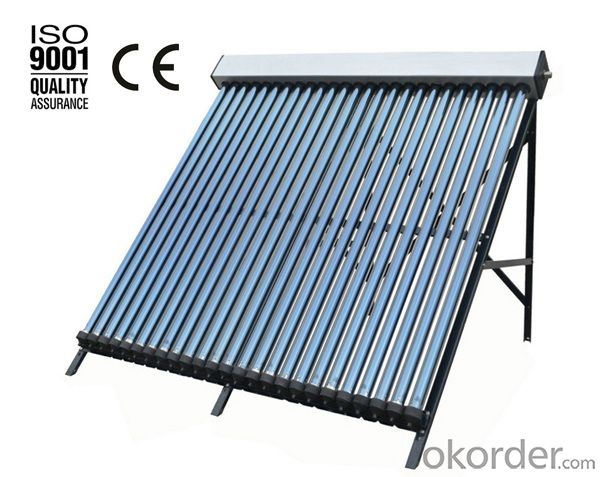
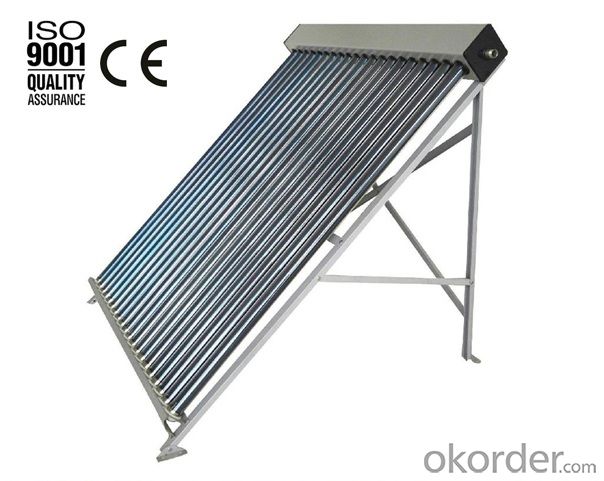
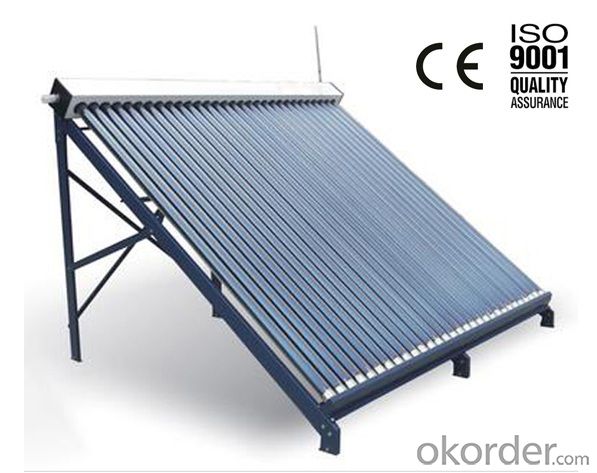
Benefits of this kind of solar water heaters:
1. Prolong the life of your existing water heater
2.Costs less than an electric, gas or oil water heater
3.No maintenance required
4.Lasts longer than a traditional hot water heater
5.Reduce your water heating costs
- Q: Can a solar water heater be used in combination with other water heating systems?
- Yes, a solar water heater can be used in combination with other water heating systems. It can act as a supplemental or pre-heating system, reducing the workload of traditional water heating systems and saving energy costs.
- Q: What is the expected lifespan of the backup heating element in a solar water heater?
- The expected lifespan of a backup heating element in a solar water heater can vary depending on various factors such as the quality of the heating element, usage patterns, and maintenance. However, on average, a backup heating element in a solar water heater can last anywhere from 5 to 10 years.
- Q: How does a solar water heater impact home resale value?
- A solar water heater can have a positive impact on home resale value. As energy efficiency becomes an increasingly important factor for homebuyers, having a solar water heater installed can be seen as a valuable feature that sets the property apart from others. Solar water heaters use the sun's energy to heat water, reducing the reliance on traditional energy sources such as gas or electricity. This leads to lower utility bills, which is an attractive selling point for potential buyers. Additionally, as more people become environmentally conscious, having a renewable energy system like a solar water heater can be seen as a sustainable and eco-friendly feature that adds value to a home. Furthermore, many governments and municipalities offer incentives and rebates for installing solar water heaters, which can further enhance the financial benefits for homeowners. These incentives can make the investment in a solar water heater more attractive and increase the overall resale value of the property. It is important to note that the actual impact on home resale value may vary depending on various factors such as the location of the property and the overall demand for energy-efficient homes in the market. However, as the demand for green technology and energy-efficient features continues to grow, having a solar water heater can certainly contribute positively to the overall appeal and value of a home.
- Q: Can a solar water heater be used in areas with limited access to solar rebates?
- Yes, a solar water heater can still be used in areas with limited access to solar rebates. While solar rebates can help offset the initial cost of installing a solar water heater, they are not the only factor to consider. The primary benefit of a solar water heater is its ability to use the sun's energy to heat water, reducing reliance on traditional energy sources and lowering utility bills. Therefore, even without rebates, a solar water heater can still be a cost-effective and eco-friendly option for areas with limited access to solar incentives.
- Q: Are there any disadvantages of installing a solar water heater?
- Yes, there are a few disadvantages of installing a solar water heater. Firstly, the upfront cost of purchasing and installing a solar water heater can be relatively high compared to traditional water heaters. Additionally, the effectiveness of a solar water heater is largely dependent on the availability of sunlight, so it may not perform optimally in cloudy or shaded areas. Maintenance and repairs can also be more expensive and specialized due to the complex nature of the system. Lastly, solar water heaters usually require ample space for installation, which may not be feasible for all households or buildings.
- Q: When solar water heater comes into China
- All glass tubes in the beginning of a foreign application, there are U tube. Direct water, not accepted, is still not accepted until now, because the glass absorbs easily.
- Q: What is a passive solar water heater?
- A passive solar water heater is a system that utilizes the sun's energy to heat water in a natural and energy-efficient manner, without the need for mechanical or electrical components. It typically consists of a storage tank and a series of pipes or tubes, through which water flows and gets heated by the sun's rays. The design of the system allows for maximum absorption of sunlight and minimal heat loss, resulting in cost savings and reduced environmental impact.
- Q: Can a solar water heater be used in areas with limited wood availability?
- Yes, a solar water heater can be used in areas with limited wood availability. Unlike traditional water heaters that rely on burning wood or other fuels, solar water heaters use the sun's energy to heat water. They consist of solar panels or collectors that absorb sunlight and transfer the heat to a storage tank, providing hot water without the need for wood or any other fuel source. Therefore, in areas with limited wood availability, a solar water heater can be a reliable and sustainable alternative for meeting the hot water needs of households or businesses. It is important to note that the efficiency of a solar water heater may vary depending on factors such as the amount of sunlight available, the climate, and the specific design of the system. However, even in areas with less sunlight, solar water heaters can still provide a significant amount of hot water, reducing the reliance on wood or other energy sources.
- Q: How does a solar water heater affect water heating time?
- A solar water heater can significantly reduce water heating time compared to traditional methods. The solar collector absorbs sunlight and heats the water, which can be much faster than relying solely on electricity or gas. Additionally, solar water heaters often use insulated storage tanks to store hot water for longer periods, ensuring a constant supply of heated water.
- Q: Overflow port leakage, but the computer controller water level has been shown full of water, what is the reason?
- Inlet solenoid valve bad chance to reach 99%, perhaps something card main solenoid valve gasket
Send your message to us
High Quality 150L Solar Water Heater with Aluminum Alloy Frame - Solar Water Heater Manufacturer
- Loading Port:
- China main port
- Payment Terms:
- TT OR LC
- Min Order Qty:
- 10 set
- Supply Capability:
- 10000 set/month
OKorder Service Pledge
OKorder Financial Service
Similar products
Hot products
Hot Searches
Related keywords
